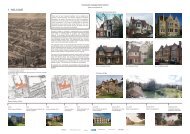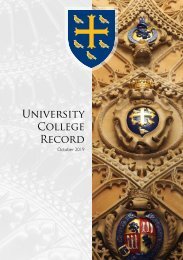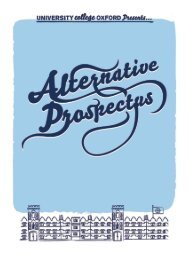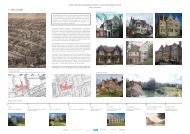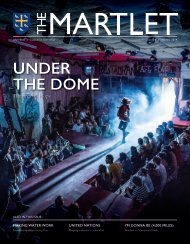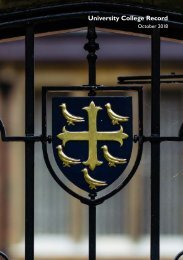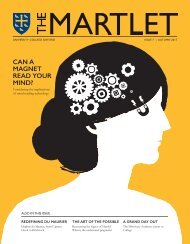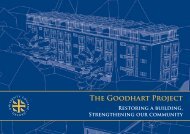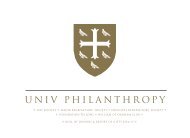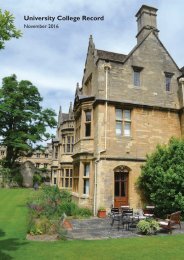You also want an ePaper? Increase the reach of your titles
YUMPU automatically turns print PDFs into web optimized ePapers that Google loves.
O- and A-levels. But of much more importance, I found that history is about analysing<br />
why something happened, reflecting on the different outcomes that might have occurred,<br />
and seeing the bigger picture at the same time as relating to the very personal. Above<br />
all he encouraged me to develop the ability to inhabit a particular era and see the world<br />
as it was then and not with the benefit of hindsight ... Another lifelong lesson he taught<br />
me through his approach to history is that, if you want to know where you are going, you<br />
need to know where you have come from.<br />
“He was also in charge of the school’s debating team and I think he was its best coach<br />
precisely because as a master reader and teacher of history, he had a logical and enquiring<br />
mind … One special joy was being captain of the team when we beat St. Michael’s<br />
College, Leeds, whose pupils were all coached by very logical Jesuits.”<br />
Dermot is survived by Sylvia, his wife of 52 years, and their three sons. We are very<br />
grateful to Sylvia for supplying the information for this tribute.<br />
JOHN EDWARD DONNE (Charterhouse) died in October 2016 aged 83. He read<br />
History at <strong>Univ</strong>. His father was part of that <strong>Univ</strong> crew which went Head of the River in<br />
1914. The following tribute is taken from a eulogy given by Roddy Dewe (1954) at John’s<br />
funeral.<br />
Maurice Hynett, John Duncan and I met John in the autumn of 1954, during our<br />
first term at <strong>Univ</strong>ersity College, Oxford. He’d already been up a year and, having done<br />
his National Service, he made it clear that he was too old to tolerate the college’s petty<br />
restrictions. So he was often caught climbing in at night after the gates were shut, and<br />
fined by the Dean.<br />
John’s father was in the Colonial Service, based up country from Dar-es-Salaam.<br />
John always stressed to me that, although he was born in England, he was conceived in<br />
Africa and that, after he was born, his mother took him straight back there. He loved the<br />
five years he spent in East Africa.<br />
What distinguished John and me from most of the other undergraduates was that<br />
his father, and my grandfather, had been at <strong>Univ</strong> and, apart from being approved by<br />
the Dean as “good chaps” we didn’t have to take<br />
any other entrance qualifications. We got to<br />
know each other mainly through playing cricket<br />
together, especially during the College tours we<br />
made around the West Country.<br />
When he left Oxford, he found a graduate<br />
trainee job at Unilever in Sheffield. A couple of<br />
years later, John joined Ford.<br />
Before their marriage Eithne shared a flat<br />
in London with my wife-to-be Anne. I invited<br />
them both to a party, and it was there she met<br />
John, and it was love at first sight. Once wed, they<br />
moved to Battersea where their son Adrian was<br />
born and fifteen months later Susie appeared.<br />
Tiring of Ford, John took a marketing job<br />
in the IMI-owned ammunition manufacturer<br />
Ely Kynock in Birmingham. After a while, he<br />
felt that he wasn’t going to get any further in<br />
70<br />
the company. Winchester Rifles had offered him the opportunity to launch a European<br />
subsidiary and he leapt at the chance. The family moved to a house at Tunnel Farm, near<br />
Droitwich, where Eithne would develop her skills as an artist.<br />
John decided to retire when Winchester sold the business, but there was plenty of<br />
overseas consulting work which kept him busy.<br />
Tragically, Eithne died in 2010 and Adrian in 2013. Susie looked after John who<br />
became increasingly bedridden. When it became clear that there was nothing more that<br />
the doctors could do, he came back to Tunnel Farm and after a short while passed away<br />
peacefully.<br />
NORMAN THOMAS PHILIP MURPHY (Wimbledon College) died on 18 October 2016<br />
aged 83. “Spud” Murphy, as he was known to his friends, read Jurisprudence at <strong>Univ</strong>,<br />
having served in Egypt during his National Service. On going down from Oxford, he<br />
taught Latin and History at the Dragon School in Oxford, and then sold typewriters<br />
for IBM. Dissatisfied with his position, he returned to the army, joining the Ordnance<br />
Corps in 1959, and remained in the army for the rest of his career, rising to the rank<br />
of Lieutenant-Colonel. He was posted to the Ministry of Defence, where he became<br />
a specialist in logistics. He once claimed, with justification, it appears, to have been<br />
the only person in NATO to know what that organisation possessed, and where the<br />
equipment was to be found, and later served in Northern Ireland, Germany and Aden.<br />
On retiring from the Army, he and his wife Charlotte moved to Cumbria, where he<br />
served as a local councillor, but from there he was briefly called back to write NATO’s<br />
first logistics manual.<br />
In his later years, however, Spud acquired a completely different reputation as an<br />
authority on the life and work of P. G. Wodehouse. He became convinced that many of<br />
the people and places in Wodehouse’s novels and short stories were based on real people<br />
and places, though many powerful literary names disagreed. In the 1970s, he regularly<br />
spent his lunch breaks from the Ministry of Defence researching Wodehouse’s origins<br />
at the British Library, and in 1981 he privately published the fruits of his research in In<br />
Search of Blandings. After it was reissued by Secker and Warburg, and became a bestseller,<br />
the world accepted his view. He published other books about Wodehouse, including<br />
The Reminiscences of the Hon Galahad Threepwood (1995) and A Wodehouse Handbook<br />
(2 volumes, 2006), and in 1997 he founded the British branch of the P. G. Wodehouse<br />
Society.<br />
Spud proved to be a lively and popular speaker, regularly arranging tours of<br />
Wodehouse-related locations. It was on one of these walks that, shortly after his wife’s<br />
death in 1999, Spud met Elin Woodger, President of the American Wodehouse Society.<br />
They married on Long Island in 2001. On his death, many tributes were paid from all<br />
areas of his life to Spud’s effervescent energy, his kindness and warmth of personality,<br />
and his phenomenal memory. [We thank Patrick Nobes (1953) for his help with this<br />
tribute.]<br />
71




